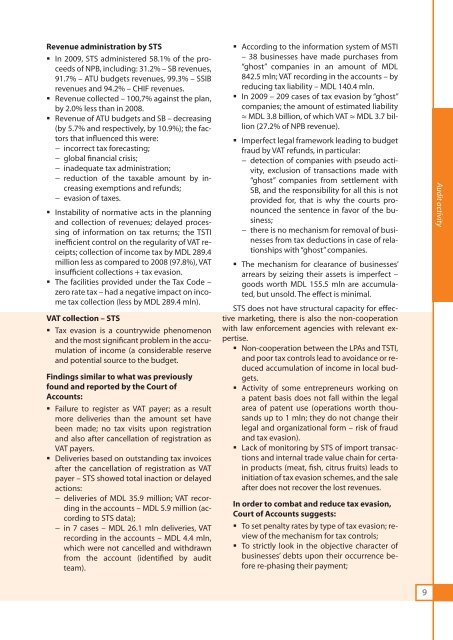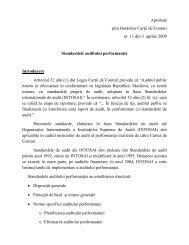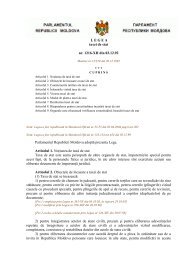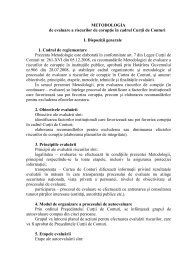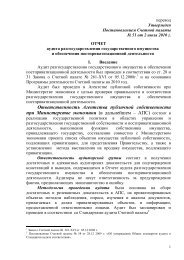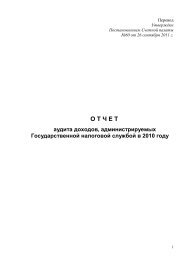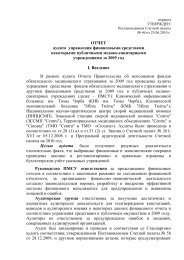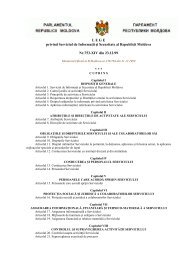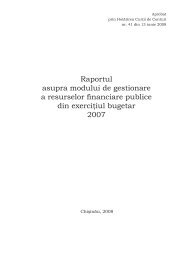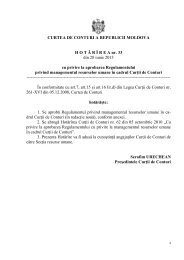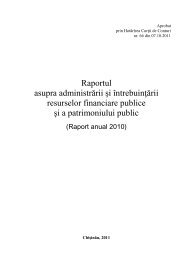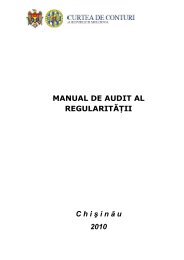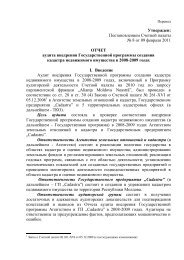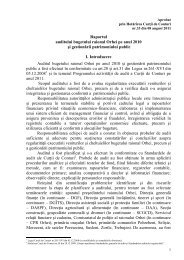Buletin 3_4-2010 web.pdf - Curtea de Conturi a Republicii Moldova
Buletin 3_4-2010 web.pdf - Curtea de Conturi a Republicii Moldova
Buletin 3_4-2010 web.pdf - Curtea de Conturi a Republicii Moldova
Create successful ePaper yourself
Turn your PDF publications into a flip-book with our unique Google optimized e-Paper software.
evenue administration by StS<br />
In 2009, STS administered 58 .1% of the proceeds<br />
of NPB, including: 31 .2% – SB revenues,<br />
91 .7% – ATU budgets revenues, 99 .3% – SSIB<br />
revenues and 94 .2% – CHIF revenues .<br />
Revenue collected – 100,7% against the plan,<br />
by 2 .0% less than in 2008 .<br />
Revenue of ATU budgets and SB – <strong>de</strong>creasing<br />
(by 5 .7% and respectively, by 10 .9%); the factors<br />
that influenced this were:<br />
− incorrect tax forecasting;<br />
− global financial crisis;<br />
− ina<strong>de</strong>quate tax administration;<br />
−<br />
reduction of the taxable amount by in-<br />
creasing exemptions and refunds;<br />
− evasion of taxes .<br />
Instability of normative acts in the planning<br />
and collection of revenues; <strong>de</strong>layed processing<br />
of information on tax returns; the TSTI<br />
inefficient control on the regularity of VAT receipts;<br />
collection of income tax by MDL 289 .4<br />
million less as compared to 2008 (97 .8%), VAT<br />
insufficient collections + tax evasion .<br />
The facilities provi<strong>de</strong>d un<strong>de</strong>r the Tax Co<strong>de</strong> –<br />
zero rate tax – had a negative impact on income<br />
tax collection (less by MDL 289 .4 mln) .<br />
Vat collection – StS<br />
Tax evasion is a countrywi<strong>de</strong> phenomenon<br />
and the most significant problem in the accumulation<br />
of income (a consi<strong>de</strong>rable reserve<br />
and potential source to the budget .<br />
findings similar to what was previously<br />
found and reported by the Court of<br />
accounts:<br />
Failure to register as VAT payer; as a result<br />
more <strong>de</strong>liveries than the amount set have<br />
been ma<strong>de</strong>; no tax visits upon registration<br />
and also after cancellation of registration as<br />
VAT payers .<br />
Deliveries based on outstanding tax invoices<br />
after the cancellation of registration as VAT<br />
payer – STS showed total inaction or <strong>de</strong>layed<br />
actions:<br />
−<br />
−<br />
<strong>de</strong>liveries of MDL 35 .9 million; VAT recor-<br />
ding in the accounts – MDL 5 .9 million (according<br />
to STS data);<br />
in 7 cases – MDL 26 .1 mln <strong>de</strong>liveries, VAT<br />
recording in the accounts – MDL 4 .4 mln,<br />
which were not cancelled and withdrawn<br />
from the account (i<strong>de</strong>ntified by audit<br />
team) .<br />
According to the information system of MSTI<br />
– 38 businesses have ma<strong>de</strong> purchases from<br />
“ghost” companies in an amount of MDL<br />
842 .5 mln; VAT recording in the accounts – by<br />
reducing tax liability – MDL 140 .4 mln .<br />
In 2009 – 209 cases of tax evasion by “ghost”<br />
companies; the amount of estimated liability<br />
≈ MDL 3 .8 billion, of which VAT ≈ MDL 3 .7 billion<br />
(27 .2% of NPB revenue) .<br />
Imperfect legal framework leading to budget<br />
fraud by VAT refunds, in particular:<br />
−<br />
−<br />
<strong>de</strong>tection of companies with pseudo acti-<br />
vity, exclusion of transactions ma<strong>de</strong> with<br />
“ghost” companies from settlement with<br />
SB, and the responsibility for all this is not<br />
provi<strong>de</strong>d for, that is why the courts pronounced<br />
the sentence in favor of the business;<br />
there is no mechanism for removal of busi-<br />
nesses from tax <strong>de</strong>ductions in case of relationships<br />
with “ghost” companies .<br />
The mechanism for clearance of businesses’<br />
arrears by seizing their assets is imperfect –<br />
goods worth MDL 155 .5 mln are accumulated,<br />
but unsold . The effect is minimal .<br />
STS does not have structural capacity for effective<br />
marketing, there is also the non-cooperation<br />
with law enforcement agencies with relevant expertise<br />
.<br />
Non-cooperation between the LPAs and TSTI,<br />
and poor tax controls lead to avoidance or reduced<br />
accumulation of income in local budgets<br />
.<br />
Activity of some entrepreneurs working on<br />
a patent basis does not fall within the legal<br />
area of patent use (operations worth thousands<br />
up to 1 mln; they do not change their<br />
legal and organizational form – risk of fraud<br />
and tax evasion) .<br />
Lack of monitoring by STS of import transactions<br />
and internal tra<strong>de</strong> value chain for certain<br />
products (meat, fish, citrus fruits) leads to<br />
initiation of tax evasion schemes, and the sale<br />
after does not recover the lost revenues .<br />
In or<strong>de</strong>r to combat and reduce tax evasion,<br />
Court of accounts suggests:<br />
To set penalty rates by type of tax evasion; review<br />
of the mechanism for tax controls;<br />
To strictly look in the objective character of<br />
businesses’ <strong>de</strong>bts upon their occurrence before<br />
re-phasing their payment;<br />
9<br />
Audit activity


